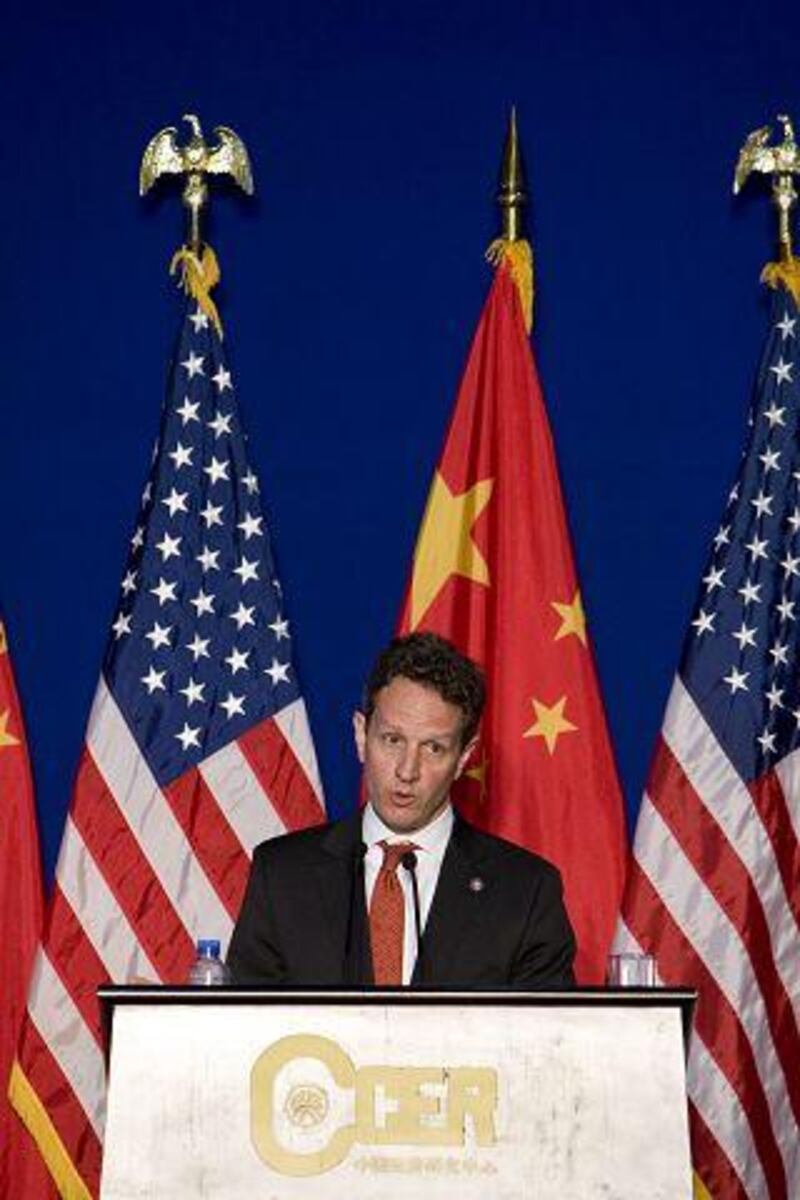Washington's relations with China seem to respond inversely to global credit markets; the wider the spreads on US sovereign debt, the more accommodating US politicians and policy makers are of Beijing. The US Treasury secretary Timothy Geithner met Chinese leaders over the weekend to soothe their worries about the future of the dollar and America's public debt. The polyglot Mr Geithner wanted to send a clear message - in his fluent Mandarin, no less - that despite massive US deficits, the US is serious about fiscal responsibility.
Its delivery was somewhat overdue. As the world's biggest investor in US government securities, Beijing is naturally uneasy about the outlook for dollar-denominated securities at a time when the creditworthiness of some industrialised economies is in doubt. Just two weeks ago, global stock, bond and currency markets tumbled after Standard & Poor's, the ratings agency, implied the US was next on its list, having downgraded its short-term outlook on Britain's "AAA" credit rating. And why shouldn't it be? According to the Congressional Budget Office, America's public debt, currently at 41 per cent of GDP, could reach 100 per cent without serious efforts to reverse the trend. Budget deficits, meanwhile, are expected to trend at about US$1 trillion (Dh3.67tn) for several years.
China owns nearly $800 billion in US sovereign notes, known as treasuries, and together with Japan accounts for about half of America's outstanding public debt. Until recently, US treasuries were considered a safe refuge in a tempest of risk and uncertainty. In December, the yield on the benchmark 10-year treasury bill sank briefly to zero per cent, so exhausted were other investment options and so real was the prospect of deflation.
But as this column warned at the time, investor enthusiasm for long-term US government debt was grudging given the rate at which Washington was printing dollars to pay for its various stimulus packages and financial bailouts. Yields recovered in January and have been heading north ever since; initially in response to the allure of emerging markets and most recently because of concerns about inflation and the prospect of a $2tn glut of new treasuries scheduled for auction this year.
Last week, the yield on the 10-year note rose to 3.74 per cent, its highest level since November. At current rates, it has recovered more than half its decline from a high of 5.30 per cent struck on the eve of the credit crunch in June 2007. Mortgage rates have risen accordingly, which could smother any hopes for recovery of the US housing industry. With expectations of long-term inflation rising, bond investors are shifting their focus on short-term US bills, which offer maturities that are measured in weeks rather than years. According to Credit Suisse, China has increased its share of outstanding short-term bills to nearly 10 per cent, up from about 1 per cent in September, while its ratio of long-term notes and bonds fell from 15.1 per cent last August to 12.7 per cent in March. Briefly last month, according to David Walker, a former US comptroller general, it cost investors more money to insure themselves against a US government default than it did to buy protection on debt issued by McDonald's, the fast-food giant.
Which brings us back to Mr Geithner's hand-holding mission to Beijing. As expected, he urged his hosts to promote domestic demand over exports as the engine of Chinese growth, which would help right global trade imbalances. It was an abundance of Chinese-made goods made cheap by Beijing's weak currency that fuelled the habit of Americans to spend more money than they earn. (That, plus a banking sector that hooked already gluttony-prone US consumers on deceptively affordable loans.)
What was interesting about Mr Geithner's face time with China's leaders, however, was what was not discussed. Mr Geithner played down the matter of Chinese currency manipulation, condemned by some US politicians angling for cheap political points, to the ire of Beijing. While there was nothing of the kowtow to Mr Geithner's visit, the days of China-hectoring by Washington are clearly over. Mr Geithner is not the only senior US official to tread lightly over hundred-year eggshells these days. In February, Hillary Clinton, the US secretary of state, told reporters she would not call attention to China's human-rights record prior to her debut visit to Beijing.
Less than two weeks ago, Nancy Pelosi, the Democratic party leader, visited Beijing and pointedly omitted any talk of human rights, despite the 20th anniversary on Thursday of the Tiananmen pro-democracy student demonstration. It was Ms Pelosi who, in 1991, outraged China's leaders by unfurling a banner in the middle of Tiananmen Square, the centre of the violence, to memorialise its victims. At the time, the US was poised at the inflection of a decade-long economic boom that would produce the country's first budget surplus in decades.
Now, with Washington staring down the barrel of across-the-board deficits that will take a generation to unwind, promotion of human rights is another indulgence - along with Hummers and flat-panel TVs - that America can no longer afford. sglain@thenational.ae





